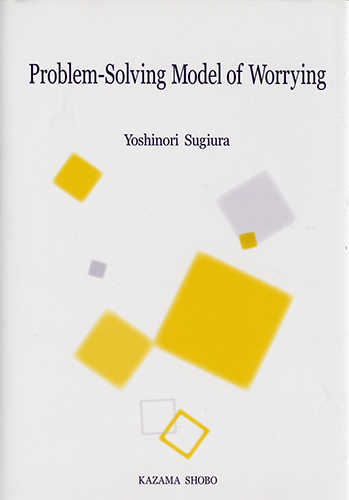
Problem-Solving Model of Worrying
定価9,900円(本体 9,000円+税)
「ストレス対処から見た心配の認知的メカニズム」の英訳。ストレス対処研究と異常心理学のインターフェースを提供。
【著者略歴】
杉浦義典(すぎうら よしのり)
1973年 愛知県に生まれる
1996年 東京大学教育学部教育心理学科卒業
1998年 東京大学大学院教育学研究科修士課程修了
2000年 日本学術振興会特別研究員
2002年 東京大学大学院教育学研究科博士課程修了(博士(教育学))
2004年 信州大学人文学部助教授
専攻
異常心理学・臨床心理学
著書
『ストレス対処からみた心配の認知的メカニズム』(風間書房 2003)など
【著者略歴】
杉浦義典(すぎうら よしのり)
1973年 愛知県に生まれる
1996年 東京大学教育学部教育心理学科卒業
1998年 東京大学大学院教育学研究科修士課程修了
2000年 日本学術振興会特別研究員
2002年 東京大学大学院教育学研究科博士課程修了(博士(教育学))
2004年 信州大学人文学部助教授
専攻
異常心理学・臨床心理学
著書
『ストレス対処からみた心配の認知的メカニズム』(風間書房 2003)など
目次を表示
Part I Study Aim
Chapter l Overview of Past Studies
1.1 What is Worry?
1.2 Phenomenal Nature of Worry
1.3 Mechanism of Anxious Cognition:Automatic Processing and Controlled Processing
1.4 Studies on the Automatic Processing behind Worry
1.5 Studies on the Active Control of Worry
1.6 Importance in Focusing on the Problem Solving Motives
Chapter 2 Objective and Methodology of the Study
2.1 Conceptual Framework of the Study
2.2 Methodology of the Study
2.3 Study Outline
Part II Empirical Studies Focused on the Problem-Solving Motives and Strategies
Chapter 3 Study l:Relationship between Problem-Solving Motive and Uncontrollability of Worry
3.1 Theoretical Background
3.2 Findings of Preceding Studies:Problem?Solving Orientation of Worry
3.3 Objective
3.4 Method
3.5 Results
3.6 Discussion
3.7 Summary
Chapter 4 Study2:Relationship between Problem-Solving Strategies and Uncontrollability of Thoughts
4.1 Theoretical Background
4.2 Findings of Preceding Studies:Coping Strategies and Uncontrollability of Thoughts
4.3 Objective
4.4 Method
4.5 Results and Discussion
4.6 General Discussion
4.7 Summary
Chapter 5 Study3:Factors Mediating the Relationship between Problem-Solving Strategies and Uncontrollability of Thoughts
5.1 Theoretical Background
5.2 Findings of Preceding Studies:Meta-Cognitions that Prolong Thinking
5.3 Objective
5.4 Method
5.5 Results and Discussion
5.6 General Discussion
5.7 Summary
Part III Conclusion
Chapter 6 Conclusion of Study and Its Suggestions
6.1 Mechanism of Worry
6.2 Reinterpretation of the Mechanism of Worry from the Framework of Motivation Theory
6.3 Implication in terms of Stress Coping
6.4 Suggestions for Future Studies
6.5 Conclusion
References
Epilogue
Chapter l Overview of Past Studies
1.1 What is Worry?
1.2 Phenomenal Nature of Worry
1.3 Mechanism of Anxious Cognition:Automatic Processing and Controlled Processing
1.4 Studies on the Automatic Processing behind Worry
1.5 Studies on the Active Control of Worry
1.6 Importance in Focusing on the Problem Solving Motives
Chapter 2 Objective and Methodology of the Study
2.1 Conceptual Framework of the Study
2.2 Methodology of the Study
2.3 Study Outline
Part II Empirical Studies Focused on the Problem-Solving Motives and Strategies
Chapter 3 Study l:Relationship between Problem-Solving Motive and Uncontrollability of Worry
3.1 Theoretical Background
3.2 Findings of Preceding Studies:Problem?Solving Orientation of Worry
3.3 Objective
3.4 Method
3.5 Results
3.6 Discussion
3.7 Summary
Chapter 4 Study2:Relationship between Problem-Solving Strategies and Uncontrollability of Thoughts
4.1 Theoretical Background
4.2 Findings of Preceding Studies:Coping Strategies and Uncontrollability of Thoughts
4.3 Objective
4.4 Method
4.5 Results and Discussion
4.6 General Discussion
4.7 Summary
Chapter 5 Study3:Factors Mediating the Relationship between Problem-Solving Strategies and Uncontrollability of Thoughts
5.1 Theoretical Background
5.2 Findings of Preceding Studies:Meta-Cognitions that Prolong Thinking
5.3 Objective
5.4 Method
5.5 Results and Discussion
5.6 General Discussion
5.7 Summary
Part III Conclusion
Chapter 6 Conclusion of Study and Its Suggestions
6.1 Mechanism of Worry
6.2 Reinterpretation of the Mechanism of Worry from the Framework of Motivation Theory
6.3 Implication in terms of Stress Coping
6.4 Suggestions for Future Studies
6.5 Conclusion
References
Epilogue
